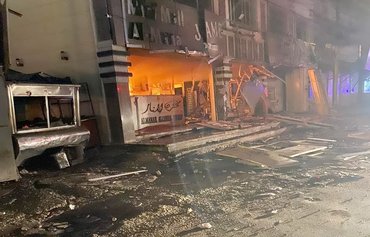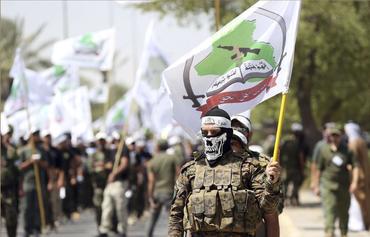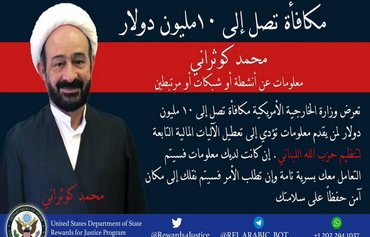Faced with a cash shortfall, Iran-aligned militias in Syria have been seeking out alternative revenue streams as their benefactor and backer, the Iranian regime, contends with an economic collapse, journalists told Diyaruna.
Militiamen in Syria have been stealing private property to raise the money they need in order to function, stripping the homes of displaced residents of anything of value they can sell, Syrian journalist Ziyad al-Munjid told Diyaruna.
This type of looting, known in Syria as "taafeesh", even extends to the removal of the doors and windows of private homes, he said, and has been prevalent in many areas that are under the militias' control.
For close to a decade, Iran has been dispatching militias comprised of Iraqi, Lebanese, Afghan and Pakistani nationals to defend the Syrian regime and quell the popular uprising against it.
![A Kataib Hizbullah convoy passes through the eastern Deir Ezzor town of al-Mayadeen on June 8th. [Photo via the Deir Ezzor Facebook page]](/cnmi_di/images/2020/12/14/27372-Syria-Iraqi-militia-600_384.jpg)
A Kataib Hizbullah convoy passes through the eastern Deir Ezzor town of al-Mayadeen on June 8th. [Photo via the Deir Ezzor Facebook page]
Al-Munjid said the flow of militiamen has not stopped, with 30,000 Iran-aligned militiamen now spread out across Syria, most of them Iraqis.
The top Iraqi militias operating in Syria are Kataib Hizbullah, Asaib Ahl al-Haq, Harakat al-Nujaba, Sayyid al-Shuhada Brigades, Imam Ali Brigades and al-Abdal Movement, he said, most of which are stationed near the Iraq border.
Zulfiqar Brigade, also active in Syria, is led by Haider al-Jubouri, who fought in Aleppo and was responsible for the 2013 Nabek massacre in Qalamoun, which resulted in dozens of civilian deaths, he said.
Saraya al-Khurasani provides protection for the Damascus airport, and the Martyr Muhammad Baqir al-Sadr Forces are deployed in Damascus, he added, pointing out that there are many other Iran-aligned militias in Syria.
Cross-border smuggling
Now facing funding shortfalls that are a direct consequence of the US sanctions on Iran, militias aligned with the Islamic Republic are seeking to self-finance by establishing new revenue streams, journalist Ziyad al-Sinjari said.
Among the top revenue-generating endeavors are large-scale smuggling operations to move drugs, weapons, goods, livestock and oil derivatives to Syria and Lebanon via unofficial land crossings on the Iraq-Syria border, he said.
Iraqi militias Kataib Hizbullah, Asaib Ahl al-Haq and Harakat al-Nujaba are spearheading many of these illicit operations, he said.
Revenue from these activities, estimated in the millions of dollars, has been declining in recent months, however, after the Iraqi government tightened border control measures and closed illegal crossings, al-Sinjari said.
He noted that Iraqi militias receive monthly salaries from the portion of Iraq's budget that is allocated to the paramilitary Popular Mobilisation Forces (PMF). Some fighters receive the money through bank transfers from Iraq to Syria.
In a November 18th report, Al-Araby Al-Jadeed cited an Iraqi official who said Baghdad had provided Iraqi factions in Syria with more than $3 million a month.
According to the Iraqi official, each militiaman receives about $800 per month, and the two banks involved in the transfers are facing possible US sanctions.

![Two members of the Iran-backed Fatemiyoun (Afghan Shia) militia are seen in eastern Syria on November 25th. [Photo via Sada al-Sharqiya Facebook page]](/cnmi_di/images/2020/12/14/27373-Iraq-Afghan-militia-600_384.jpg)






